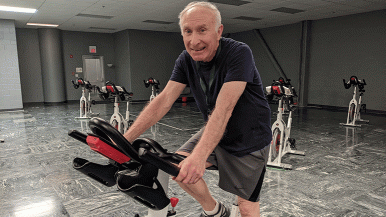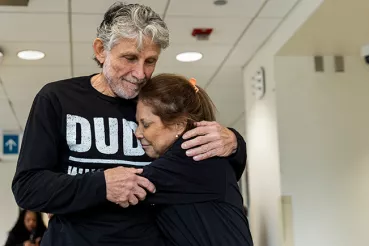Wayne Janovsky always enjoyed working out before starting his day. He would run and feel energized. “It cleared my head and made me feel great,” he says.
But a few years ago, he started feeling stiff, like he couldn’t run his usual three miles. His doctor said it was probably old age.
A year later, he noticed more symptoms. He felt himself getting anxious and his right hand started to shake. His doctor sent him to a neurologist, who ordered a scan of Wayne’s brain. Wayne was diagnosed with Parkinson’s disease.
Many layers and symptoms
Glad to have a diagnosis, Wayne went back to work, not realizing the many layers of Parkinson’s and all of the challenges that come with it — more layers than he ever imagined. The following year, he retired from his job of 40 years, earlier than planned due to his disease.
He is now committed to being “the best I can be for as long as I can be.”
“It’s a nasty disease but we can’t let it define us,” he says. “I don’t want to be a burden on my family.”
Learning that one of the keys to slowing the progression of the disease is to exercise, Wayne joined Rush Copley Healthplex and Rush Copley’s Movement Disorders Program.
Movement Disorders Program
Funded by philanthropic donations, the program provides support services at no cost to people with movement disorders. It is designed to help people manage their condition and maximize their movement, coordination and quality of life.
Classes include exercise, spinning, fitness drills, non-contact boxing and a mind and body class to increase flexibility, improve posture and balance, and loosen tight, painful muscles. Three levels of exercise class are offered to accommodate varying abilities, from those at a higher fitness level to those who need assistance. And, while participants exercise, they play memory games to help their brains stay sharp. The program also offers music therapy and voice classes, because Parkinson’s affects voice and speech.
The trainers encourage everyone to stay active every day, seven days a week, to work hard and to push themselves. But they also remind participants to listen to their bodies and do what feels best for them.
“We all have our own challenges,” Wayne says. “It’s not a cookie-cutter approach. They know my strengths and weaknesses as well as those of everyone in the class.”
Relieving symptoms
Although he arrives for a class feeling sore, stiff, tired and weak, working out relieves his symptoms. They may totally disappear for three to four hours if he pushes himself, he explains.
“It’s such a great feeling,” the 68-year-old says. “I feel like I’m 20 or 30 years old again. That’s why I do it — to maximize my time as long as I can.”
He likes the Movement Disorders Program because it helps keep him moving and it helps his self-esteem. He also likes the family-type approach of the program. Twice a year, the program coordinator holds a luncheon for participants and their partners.
“It’s nice to sit and break bread with other participants,” Wayne says. “You really feel like part of a family.”
‘You have to keep moving’
Although he lives in Wheaton, Wayne drives to the Healthplex five days a week to participate in the programs, arriving an hour early to use the machines, run, work on his balance or play basketball.
“It’s not just one and done,” he says. “We’ve got to do this every day, not just with the instructor.”
He compares Parkinson’s to an episode of “The Amazing Race,” where contestants are given a task to complete. When you make it to the finish line, you’re given another task.
“You have to keep moving, keep moving,” he says.
Programs and motivation
Wayne believes the Healthplex has much to offer someone with Parkinson’s, including fitness machines, free weights, pool, basketball courts, tennis and pickleball courts, spinning bikes, treadmills, ellipticals and more. They also offer a variety of fitness classes, including yoga.
When working out at the facility, Wayne gets motivation from seeing people who don’t have Parkinson’s. “I get into a mindset of, ‘If they can do it, I can do it,’” he explains. “’So what if this person is 20 years younger than me?’”
When not at the Healthplex, he continues moving, doing projects around his house, gardening, going for runs or walks. He and his wife also go dancing.
Staying positive
In life, he has found that the more positive you are, the easier things go, so he tries to stay positive. And the staff at the Healthplex and Movement Disorders Program help him do that.
“They give us a chance to feel good about ourselves,” he says. ”They give me the best of themselves which encourages me to give them the best of myself. They’re constantly challenging us, which I really enjoy.
“They make it easier to live somewhat of a normal life for longer. They really care. They’re genuine,” he says. “I feel very fortunate to be part of this program.”




